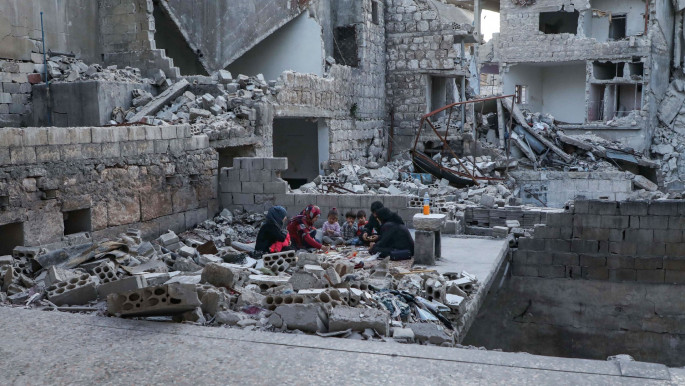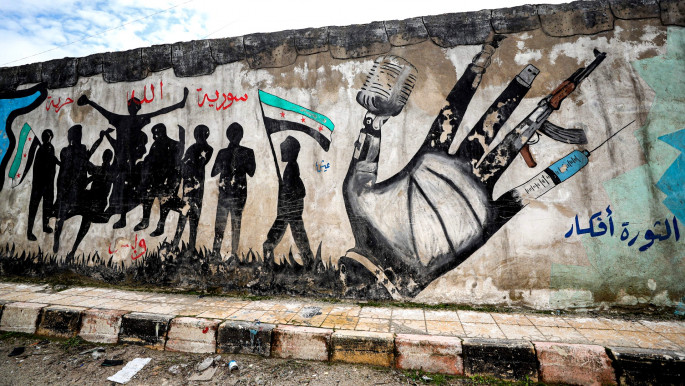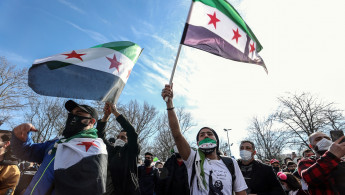Despite war and destruction, Syrian activists have no regrets on tenth anniversary of revolution
Syrians this week will mark the tenth anniversary of the Arab Spring revolution against President Bashar al-Assad's rule which took their country by storm and shaped its present-day reality.
While many Syrians today feel great sadness at the death and destruction that their country has suffered over the past ten years, Syrian activists who took part in the revolution have told The New Arab that they remain committed to the ideals of freedom and dignity which the 2011 protests espoused and have no regrets.
The beginning of the Syrian revolution is generally dated to 15 March 2011, when hundreds of activists took to the streets of Damascus in a "Day of Rage" against the authoritarianism, corruption and political persecution which had pervaded Syrian political life ever since President Bashar al-Assad's Baath Party took power in a 1963 military coup.
Sawsan Abou Zainedin, an activist from Suweida province, told The New Arab that the regime's authoritarian rule pervaded every facet of life in Syria before the revolution.
"We were raised to fear the security forces, informers, and the mukhabarat (secret police), who people said knew everything about you. They were present everywhere and this made us afraid to talk and even to think loudly. Everything was being run in a way where regime loyalists and Baath Party members got preferential treatment. In practice we were living the regime's oppression in every aspect of our daily lives – in schools and the education system, in job opportunities and university places and even in entry to hospitals."
 |
When the Arab Spring started we felt we could speak, and that change was possible |  |
Assad's regime responded to the first protests in the only way it knew how, with repression and arrests, but this was only a small foretaste of the violence it would later inflict on the Syrian people.
The uprising quickly spread across the country, however, as news of protests and their repression in one Syrian locality would quickly reach other parts of Syria through the then-new tool of social media, and people took to the streets in solidarity with the regime's victims.
One of the earliest centres of revolutionary activity was Daraa province, where the regime had detained and tortured teenage boys for scrawling anti-Assad graffiti on a wall in early March 2011.
 |
|
| Read more: How Syria's war defined a decade |
Dani Qappani, an activist from the city of Moadamiyeh near Damascus told The New Arab, "My activism started in the first months of the Syrian revolution, and it was all thanks to my city, Moadamiyeh. All of its people rose up in the early days in solidarity with Daraa, against what Assad's gangs were doing to its children and its people."
Abou Zainedin told The New Arab about the innovative forms of non-violent resistance that her and other activists in Suweida province took part in.
"When the Arab Spring started we felt we could speak, and that change was possible. People organised in a really spontaneous way. We'd organise demonstrations together and perform other acts of rebellion – paint pictures of the president with red, release balloons with revolutionary slogans on them, or write slogans on dozens of baseballs and release them all over the streets. This was our response to the violence of the regime in Homs and Daraa and other areas."
Inspiring the diaspora
Many Syrians had left their country before 2011 over the long years of Assad family rule and the protests in Syria inspired members of the Syrian diaspora to take action in support of the Syrian uprising.
Leila al-Shami, the co-author of the book Burning Country: Syrians in War and Revolution said that the Syrian revolution had defined life for her over the past decade.
"I think for all Syrians the revolution has defined the last decade for us. In 2011, when it began, I felt immense pride and admiration for the young women and men who risked their lives to attend protests calling for freedom and social justice," she told The New Arab.
 |
We can't hold the revolution and the dreams we had of freedom and justice responsible. The regime, its security forces, and its allies are responsible for the death and destruction in Syria |  |
"Being outside Syria but having friends and family inside, some of whom were involved in the protest movement, I felt a responsibility to do what I could to stand in solidarity and amplify Syrian voices to ensure that they are heard outside."
Salam Abbara, a Syrian-French medical researcher, told The New Arab that she found a big discrepancy in the way the Syrian uprising and later conflict was being reported and what was happening on the ground.
"Since the beginning of the revolution I was involved in media or humanitarian activism. I participated in an initiative to translate information from the ground to English and French because journalists could not enter Syria [at the time]. The Syrian conflict is very hard to understand to most people, and lots of people forget the most important part of it: a fight for dignity."
Tragedy and hope
Today, ten years on, the hopes of the people who took part in the original protests of the Syrian revolution seem like a distant dream. The regime received crucial support from Iran and Russia and showed that it was willing to destroy the entire country in order to stay in power. It had no reservations about deliberately targeting schools and hospitals, or using chemical weapons against civilians.
By contrast the activists who took part in the earliest protests of the Syrian revolution received little more than rhetorical support from Western and Arab states.
Syria in 2021 is in ruins. Over half a million people have been killed, mostly by the Assad regime and its allies. Nearly seven million people – over a quarter of the country's pre-war population – are refugees outside Syria and a further six million are internally displaced. It is estimated that the war has cost $1.2 trillion worth of damage and it will take decades for the country to rebuild. Eighty per cent of people in Syria live in poverty today.
 |
|
| Read more: In the shadows of Syria's revolution, a generation of activists is born |
However, despite Syria's ongoing tragedy and the failure to achieve the original goals of the revolution, the Syrian activists who The New Arab spoke to said they had no regrets.
Dani Qappani documented human rights abuses by the regime and was pursued by its security forces, while his brother was arrested. After the regime lost control of Moadamiyeh to rebels, it used chemical weapons on the city, killing hundreds of people and later overrunning the rebel stronghold
"My experience during the revolution was one of a dream fulfilled, a dream of freedom of thought and expression, a dream of liberation from servitude to individuals, to the Assad family, from all the chains restraining our minds, our eyes, and our mouths," he told The New Arab.
"Personally, I have never regretted my participation in the revolution and I will not regret it. It's an inevitable result of the oppression, repression, and criminality that Assad's gang has practiced for decades," he said.
Sawsan Abou Zainedin said that despite the hardships her country and her family experienced, she would only hold the Assad regime, not the Syrian uprising, responsible.
"Of course, I have no regrets, 100 per cent. My father, my brother, and my sister were detained and we were constantly harassed by the security forces and Assad's supporters. But we can't hold the revolution and the dreams we had of freedom and justice responsible. The regime, its security forces, and its allies are responsible for the death and destruction in Syria," she said.
 |
I don't feel regret regarding the revolution. When people suffer decades of oppression it's inevitable that they will eventually rise against tyranny |  |
Her sentiments were echoed by Leila al-Shami.
"I don't feel regret regarding the revolution. When people suffer decades of oppression it's inevitable that they will eventually rise against tyranny. My regrets relate to the brutality of the counter-revolution and the failures of the international community to act to stop the ongoing slaughter of civilians," Al-Shami said.
Salam Abbara is currently working on 100 Faces of the Syrian Revolution, a project to preserve the memory of the Syrian activists who took part in the uprising and their work. She said that so many Syrians were still working for a better future for their country.
Twitter Post
|
"Thousands of Syrians are still working every day, whether in arts, media activism, humanitarian projects, legal initiatives against impunity, local councils, women empowerment projects, and so on. So we should not forget them, and try to focus on those people who bring positive action to go further."
A long road to justice
Syrians have led a long campaign for justice against Bashar al-Assad's regime and last month, a German court sentenced a former Syrian intelligence officer to four and a half years in prison for crimes against protesters in a landmark ruling.
Abou Zainedin said that the efforts to bring justice and accountability gave her hope despite the bleak situation in Syria today.
"We have a very long way to go in order to get to a point where we can start building the country we dreamed of. We have to focus on justice, and holding criminals accountable," she said.
"We must pressure the international community to support Syrian efforts to realise justice through all legal avenues. We must also pressure them to deliver aid to Syria in a just way that respects human rights, and not contribute to strengthening the regime or rehabilitating it".
"But in the long term, I have faith that all Syrians will stand up for their rights and for justice, or at least some aspects, of it to be done. They know the road is very long but it has to be travelled," she added.
"One day Syrians will see the dream they tried to achieve become real, even if it's through very small steps and even if it doesn't happen in our generation or the next."
Qappani also said that he remained confident that the values of the revolution will bring positive change to Syria in the future.
"On the surface, the present situation is not what we wished for and not what we sacrificed for… however, since we have broken the fear barrier imposed on us for decades and as long as we don't lose hope in a free Syria and fight to establish justice and accountability for criminals from all sides, first among them Bashar al-Assad, I am confident we will see a better day, where we will cry tears of joy with one eye and tears of sadness with the other."
Follow us on Facebook, Twitter and Instagram to stay connected



